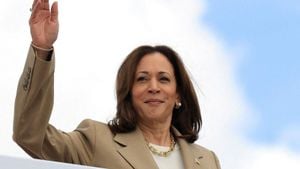The Nova Scotia provincial election results from November 26, 2024, marked a pivotal moment for the province’s political climate as the Progressive Conservative Party, under the leadership of Tim Houston, secured its second consecutive majority government. The election’s outcome saw the resignation of Liberal leader Zach Churchill after he lost his own seat, symbolizing the sharp decline of the Liberal party's influence. Conversely, the New Democratic Party (NDP), led by Claudia Chender, emerged as the new Official Opposition, reflecting its growth amid Liberal losses.
The election unfolded as residents headed to vote, with early indicators hinting at the Progressive Conservatives’ strength. Houston expressed confidence going forward, citing constituents' concerns about healthcare and affordability as key issues driving his party's platform. The atmosphere at the Progressive Conservative headquarters was electric as cheers erupted when results began to favor them.
By late Tuesday night, the Tories had made significant gains, winning 43 out of the 55 available seats, according to Elections Nova Scotia. The NDP increased its count to nine seats, affirming its role as the leading opposition party. Meanwhile, the Liberal party faced significant setbacks, going from 14 seats to just two, marking one of their worst electoral performances to date.
Churchill's defeat was particularly stunning. He lost his seat by just 14 votes to his Progressive Conservative counterpart Nick Hilton. Speaking to supporters at the Yarmouth campaign headquarters post-election, Churchill took full responsibility for the party's disappointing results, stating, "This loss belongs to me and me alone, and I’m OK with it." His acknowledgment of the party's struggles highlighted the overwhelming sentiments from voters seeking change.
Alongside Churchill, other high-profile Liberals also fell short, leaving the party to reassess its strategies moving forward. Only two Liberals managed to secure victories, with Derek Mombourquette narrowly winning his district after fending off strong competition. Despite the losses, Mombourquette hinted at potential aspirations for party leadership, stating the need for rebuilding the party. Former Liberal leader Iain Rankin, known for his tenure as Premier, also reclaimed his seat, but the broader picture painted a bleak future for the Liberal Party.
Claudia Chender celebrated her re-election, becoming not only the leader of the NDP but the first female to lead the Official Opposition. Chender remained positive, rallying her supporters with hopes of transforming the province’s legislative discourse. “The Nova Scotia NDP is on the rise,” she stated triumphantly, emphasizing her goal of creating positive change for the province. Despite the limited gain in overall popular vote, her party’s strategic targeting and outreach efforts seem to have paid off.
Political analysts noted the NDP’s performance reflected mounting public dissatisfaction with the Liberals during Churchill’s leadership, especially concerning issues like affordability and healthcare which had been persistent concerns among Nova Scotians. Tom Urbaniak, political scientist at Cape Breton University, remarked, "We’ve witnessed the collapse of the Nova Scotia Liberal Party for the time being. There will be a massive rebuilding required now." The comment succinctly encapsulates the gravity of the Liberals' electoral defeat.
While the Progressive Conservatives basked in their success, they were also set to inherit the issues plaguing the province. Houston and his party were quick to assert their commitment to standing by voters’ concerns around healthcare and housing, key topics identified during the campaign. Voters had put their trust in Houston during the last election to confront these challenges, and many felt this trust to continue forward. Nevertheless, public scrutiny will persist as strategies and reforms are set to roll out.
Among talent shifts within the Political scene, Elizabeth Smith-McCrossin made history by being re-elected as the first Independent candidate to win back-to-back elections, emphasizing the significance of local representation and regional issues over party affiliation. Smith-McCrossin highlighted health care and infrastructure concerns as pivotal aspects to focus on during her next term.
The election reflected broader societal currents, with significant voter migration from Liberal to Conservative camps largely driven by discontent with past Liberal actions. Harsh criticisms aimed at the former government’s performance helped frame the prevailing narrative among voters. Houston previously engaged voters by associatively tying Churchill's leadership with perceived failings of other higher-level Liberals, including Prime Minister Justin Trudeau, to consolidate support for his party.
With the election completed, attention now shifts to what the upcoming legislative sessions hold for the new government and opposition. The focal points around health care reforms and fiscal responsibility remain at the forefront, and both parties’ capacities to navigate the challenges effectively will shape the political dialogue.
Houston's initial moves as Premier will be closely monitored, as the success or failure of his administration will largely affect Tory trust and support. For Chender and the NDP, this newly forged retrospective as Official Opposition grants the chance to steer the conversation and counteract Conservative narratives.
The changes seen during this election are seen as potentially transformative, not only for the political party dynamics but also for the overall governance framework within which Nova Scotians operate daily. The next months will likely see redefined roles within government as parties brace themselves for future challenges and potential re-elections, with the electorate increasingly sensitive to issues directly impacting their daily lives. The Nova Scotia elections of 2024 could serve as both a wake-up call for traditional power players and a new beginning for those rising through the ranks.



